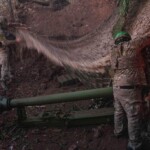The senior Hezbollah leaders killed in Friday’s Israel Defense Forces airstrike were meeting to plan an Oct.7-style invasion in northern Israel, officials said.
Members of the Iran-backed terror group’s elite Radwan Force were allegedly studying “plans for a ground invasion at the heart of the occupied territories” in northern Israel, a Hezbollah source told the Al-Monitor Middle East news outlet.
Israeli President Isaac Herzog reiterated the claims during a Sky News broadcast Sunday morning as he condemned Iran and its terror proxies.
“All of these leaders came together in order to launch the same horrific, horrendous attack that we had on Oct.7 by Hamas, by burning Israelis, by butchering them, raping their women, abducting and taking hostage people and little babies,” Herzog said.
“This is exactly the same plan they have been planning for years under the plans of the Empire of Evil of Iran,” he added.
The IDF said it killed 16 senior commanders and Hezbollah operatives during an airstrike on Friday as the terrorists gathered inside a high-rise apartment building in the Dahiya area of southern Beirut.
IDF spokesperson Rear Adm. Daniel Hagari said top leaders Ibrahim Aqil and Ahmed Wahbi were among those killed in the blast as they were allegedly scheming to invade Israel.
“Aqil and the Radwan Force commanders who we attacked are the commanders who drew up and led the Hezbollah terror group’s plan, to be carried out on the day the order was given, to attack into the northern territory of the State of Israel, what they called ‘The plan to conquer the Galilee,’” Hagari said.
Aqil and Wahbi were also allegedly part of Hezbollah’s top brass that allegedly oversaw the near-daily attacks on Israel since Oct. 8.
Following the airstrike, which Lebanese health officials left a total of 37 people dead, Hezbollah fired more than 100 rockets over the border early Sunday.
One of the missiles hit a residential building in Kiryat Bialik, wounding at least three people as thousands across northern Israel were sent scrambling for shelters.
In retaliation, Israel fired its own rocket barrage that killed at least three people and left another four wounded near the border, according to Lebanon’s health ministry.
The conflict between Israel and Hezbollah reached a boiling point after thousands of pagers, radios and other electronic devices used by members of the terror group detonated last week in attacks that were blamed on Israel.
Sources told Axios that the attacks were an attempt to reach “de-escalation through escalation” — forcing Hezbollah leaders to back down by hitting their leaders and fighters with destabilizing attacks.
While the US backs Israel’s right to defend itself, White House National Security spokesman John Kirby told ABC’s “This Week” that it is not in Israel’s “best interest” to force a military escalation.
“The tensions are much higher now than they were even just a few days ago,” Kirby said. “We still believe that there can be time and space for a diplomatic solution here and that’s what we’re working on.”
“We’ve been working since the beginning of this conflict, October 8th and on, to try to prevent an escalation, to prevent a broadening of this conflict there in and around Israel, but also in the region,” he added.






